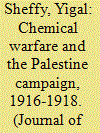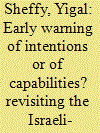| Srl | Item |
| 1 |
ID:
090364


|
|
|
|
|
| Publication |
2009.
|
| Summary/Abstract |
World War I historiography focuses on the introduction of chemical weapons to European battlefields, mainly the Western Front, but ignores their use during the Palestine Campaign. In 1917 the (British) Egyptian Expeditionary Force fired chemical-filled artillery shells against Ottoman forces. During the Second Battle of Gaza (April 1917), the chemical bombardment was unsuccessful in supporting the infantry assault. In the Third Battle of Gaza (October-November 1917), it was much more effective in its diversionary role of drawing Ottoman attention away from the main thrust toward Beersheba. This article examines the chemical operations and the Ottoman response, analyses the outcome, and suggests explanations for the historiographical disregard of these events.
|
|
|
|
|
|
|
|
|
|
|
|
|
|
|
|
| 2 |
ID:
123951


|
|
|
|
|
| Publication |
2013.
|
| Summary/Abstract |
A major school of thought in Israel asserts that: (1) a cornerstone of the Israeli security doctrine is gaining early warning based more on changes of the enemy's capabilities and less on learning its intentions; and (2) that deviation from the doctrine caused the strategic surprise experienced by the state on the outbreak of the 1973 Yom Kippur war. This assertion is examined here by looking into another case in which Israel was also militarily surprised. In February 1960 the Egyptian Army deployed offensively along the joint border, while the IDF remained unaware of the situation. Israel's conduct during the affair - known as the Rotem Affair - was based on lenient assessments (derived from sigint) regarding the Egyptian intentions, ignoring their capabilities. It transpires, therefore, that dominance of 'early warning of intentions' has been the rule rather than the exception.
|
|
|
|
|
|
|
|
|
|
|
|
|
|
|
|